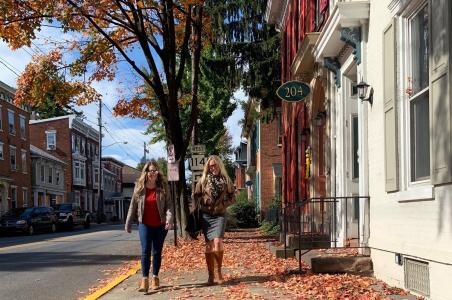Dickinson College stands out as a beacon of sustainability in the ongoing pursuit of environmental stewardship. With a steadfast commitment to environmental responsibility, Dickinson College educates future leaders and leads by example through its exemplary sustainability practices.
At the heart of Dickinson’s sustainability journey lies a multifaceted approach that intertwines education, innovation, and community engagement. Under Director Neil Leary's leadership, the Center for Sustainability Education has led the college’s efforts since 2008 to reduce its environmental footprint and inspire and empower its students and the wider community to embrace sustainability.
One of Dickinson’s hallmark programs is its comprehensive waste reduction and diversion programs. For example, through innovative recycling and composting efforts, the college diverts approximately 800 pounds of food waste from landfills daily. As part of the college’s 360-degree cycle of Farm to Fork to Farm™, all food waste is collected and turned into compost. The compost-ready waste is collected in green buckets and taken daily to Dickinson College Farm, where it is used to improve the soil and grow food for the campus and community.
The Farm, located in Boiling Springs, recently installed a biodigester that processes waste to generate renewable electricity. This electricity powers the farm's operation, and excess energy is sold back to the local power company. The first-of-its-kind system for a college farm in the Northeast serves as an agricultural energy system model for small to medium-sized dairy farms in Cumberland Valley and the surrounding region.
Furthermore, Dickinson’s commitment to energy efficiency is evident through LEED-certified buildings and investments in renewable energy sources such as a 12,500-panel solar array on 12 acres and geothermal heating. In 2020, the college became the 10th in the nation to reach zero net emissions and continues its commitment to rely less on carbon offset credits.
Dickinson’s sustainability efforts extend beyond its campus borders and reverberate throughout the local community, enriching both the environment and the lives of its residents. By reducing greenhouse gas emissions, conserving resources, and promoting sustainable practices, the college sets a powerful example for others to follow. However, Lindsey Lyons, Director of Sustainability Learning, notes that “we can’t achieve these successes without the support and partnership of the Borough and county governments.”
Faculty, staff, and students actively collaborate with local businesses, government agencies, and nonprofit organizations to address challenges facing our community, from biking to bees to climate action. Through partnerships and outreach programs, Dickinson shares its expertise, fosters a culture of sustainability that transcends institutional boundaries, and serves as a resource to facilitate local action on climate change and community resilience. “We also commonly exchange best practices with all types of local corporations and are committed to sharing our knowledge and resources with others,” notes Ms. Lyons.
In 2023, Dickinson launched a new climate resilience initiative to build resilience to our changing climate. The college’s leadership role in this initiative feeds into master planning for the Carlisle Borough and Cumberland County and will help “prevent, limit, and recover from impacts of the changing climate and adapt to flourish in an uncertain future.”
Moreover, the college integrates sustainability into its academic curriculum, ensuring students can engage with environmental, social, and economic issues to develop lasting and equitable solutions. Over 100 courses across 39 academic departments explore different dimensions of sustainability from a variety of perspectives. Dickinson requires every student to take a sustainability course as part of their general degree requirements. Ms. Lyons notes, “We remain a tried-and-true liberal arts college. Sustainability is incorporated as part of a holistic liberal arts approach. It’s something every student will do no matter what their major or area of study.”
From interdisciplinary courses to experiential learning opportunities, Dickinson equips its students with the knowledge and skills necessary to tackle complex sustainability challenges “in meaningful, responsible, ethical and just ways.”
As we celebrate Earth Day, Dickinson College is a shining example of what can be achieved through dedication, collaboration, and visionary leadership. By advancing sustainability goals and fostering positive change within the community, Dickinson demonstrates that a greener future is within reach – one sustainable step at a time.







